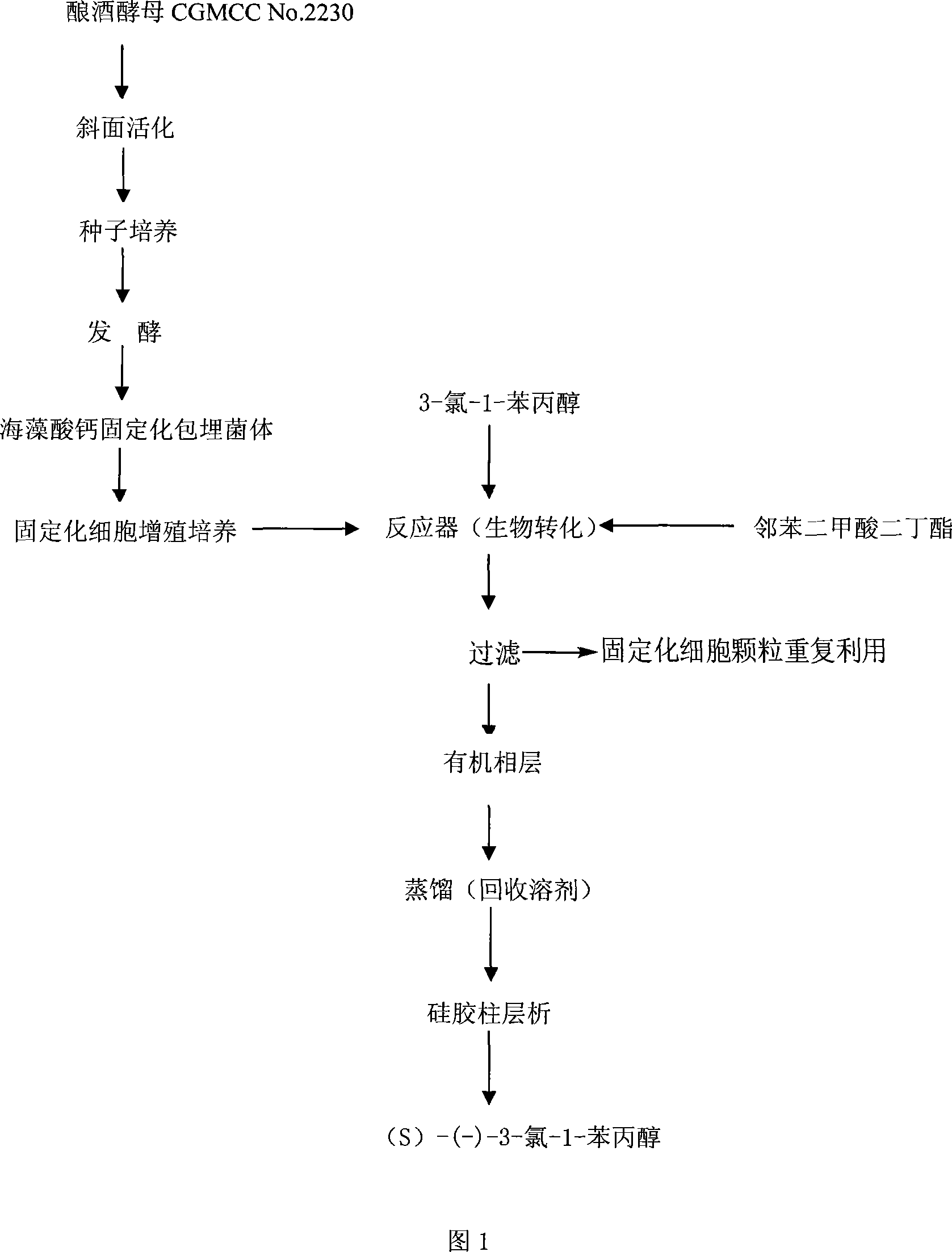Use of saccharomyces cerevisiae in preparation of (S)-(-)-3-chlorine-1-phenylpropanol
A technology of Saccharomyces cerevisiae strain and phenylpropanol, which is applied in the directions of fermentation, microorganism-based methods, biochemical equipment and methods, etc., can solve the problem that the catalytic activity of free cells is easily affected by changes in the external environment, and the conversion rate is low, which is not suitable for industrial production. , the problem of low recycling efficiency, etc., to achieve the effects of easy large-scale industrial production, low catalytic activity, and simple production and operation.
- Summary
- Abstract
- Description
- Claims
- Application Information
AI Technical Summary
Problems solved by technology
Method used
Image
Examples
Embodiment 1
[0034] Slant culture: Inoculate CGMCC No.2230 bacteria into a culture medium containing wort juice 10g / L, yeast powder 3g / L, peptone 5g / L, glucose 10g / L, agar 20g / L, and natural pH. Cultivate at 30°C for 4-6 days.
[0035] Seed cultivation and fermentation: Both the seed and fermentation medium use liquid medium, the composition is glucose 30g / L, yeast powder 3g / L, ammonium sulfate 5g / L, anhydrous MgSO 4 0.25g / L, K 2 HPO 4 ·3H 2 O 1g / L, KH 2 PO 4 1g / L. Use an inoculation needle to take a ring of bacteria from the slant culture medium and inoculate it into a 250ml Erlenmeyer flask containing 100ml of liquid medium, and culture it at 30°C and 180r / min for 24h to obtain seeds. Inoculate the seed solution with a 10% inoculum amount into a 250ml Erlenmeyer flask containing 100ml of liquid medium, cultivate it at 30°C and 180r / min for 24 hours to obtain a fermented liquid, and use the obtained fermented liquid to immobilize the bacteria .
[0036] Mix 5 bottles of 100ml fe...
Embodiment 2
[0042] CGMCC No.2230 was cultivated according to the method in Example 1 to obtain bacterial cell fermentation broth. Mix 4 bottles of 100ml fermentation broth with a dry weight of 430mg of bacteria with 2% sodium alginate solution at an equal volume concentration to make a mixed solution, put the mixed solution into a syringe, and drop 3.5% (w / v) CaCl 2 Form immobilized particles in the solution, the diameter of the formed immobilized particles is 2mm, solidify at 37°C for 30min, and the obtained immobilized particles are washed with sterile physiological saline to remove excess calcium ions and uncaptured cells, and the obtained 4 The bottle-immobilized cell particles continued to proliferate and culture in liquid medium for 0h, 24h, 48h and 72h respectively.
[0043] Add the 4 kinds of immobilized cell granules that have been proliferated and cultured to the reaction system of 300ml dibutyl phthalate, add 17.58mmol 3-chloro-1-propiophenone, and carry out the biological pro...
Embodiment 3
[0047] CGMCC No.2230 was cultivated according to the method in Example 1 to obtain bacterial cell fermentation broth. Mix 100ml of fermentation broth with a dry weight of 430mg of bacteria and 2% sodium alginate solution at an equal volume to make a mixed solution, put the mixed solution into a syringe, and add 3.5% (w / v) CaCl dropwise 2 Form immobilized particles in the solution, the diameter of the formed immobilized particles is 2mm, solidify at 37°C for 30min, the obtained immobilized particles are washed with sterile physiological saline to remove excess calcium ions and uncaptured cells, and the obtained immobilized Cell granules continued to proliferate and culture in liquid medium for 24 hours.
[0048] Add the above-mentioned immobilized cell granules cultured into 5 flasks filled with 300ml of dibutyl phthalate, and each bottle contains immobilized cell granules prepared from 100ml of fermentation broth with a dry weight of 430mg. . Add 8.79, 17.58, 26.37, 35.16 an...
PUM
| Property | Measurement | Unit |
|---|---|---|
| Diameter | aaaaa | aaaaa |
Abstract
Description
Claims
Application Information
 Login to View More
Login to View More - R&D
- Intellectual Property
- Life Sciences
- Materials
- Tech Scout
- Unparalleled Data Quality
- Higher Quality Content
- 60% Fewer Hallucinations
Browse by: Latest US Patents, China's latest patents, Technical Efficacy Thesaurus, Application Domain, Technology Topic, Popular Technical Reports.
© 2025 PatSnap. All rights reserved.Legal|Privacy policy|Modern Slavery Act Transparency Statement|Sitemap|About US| Contact US: help@patsnap.com


